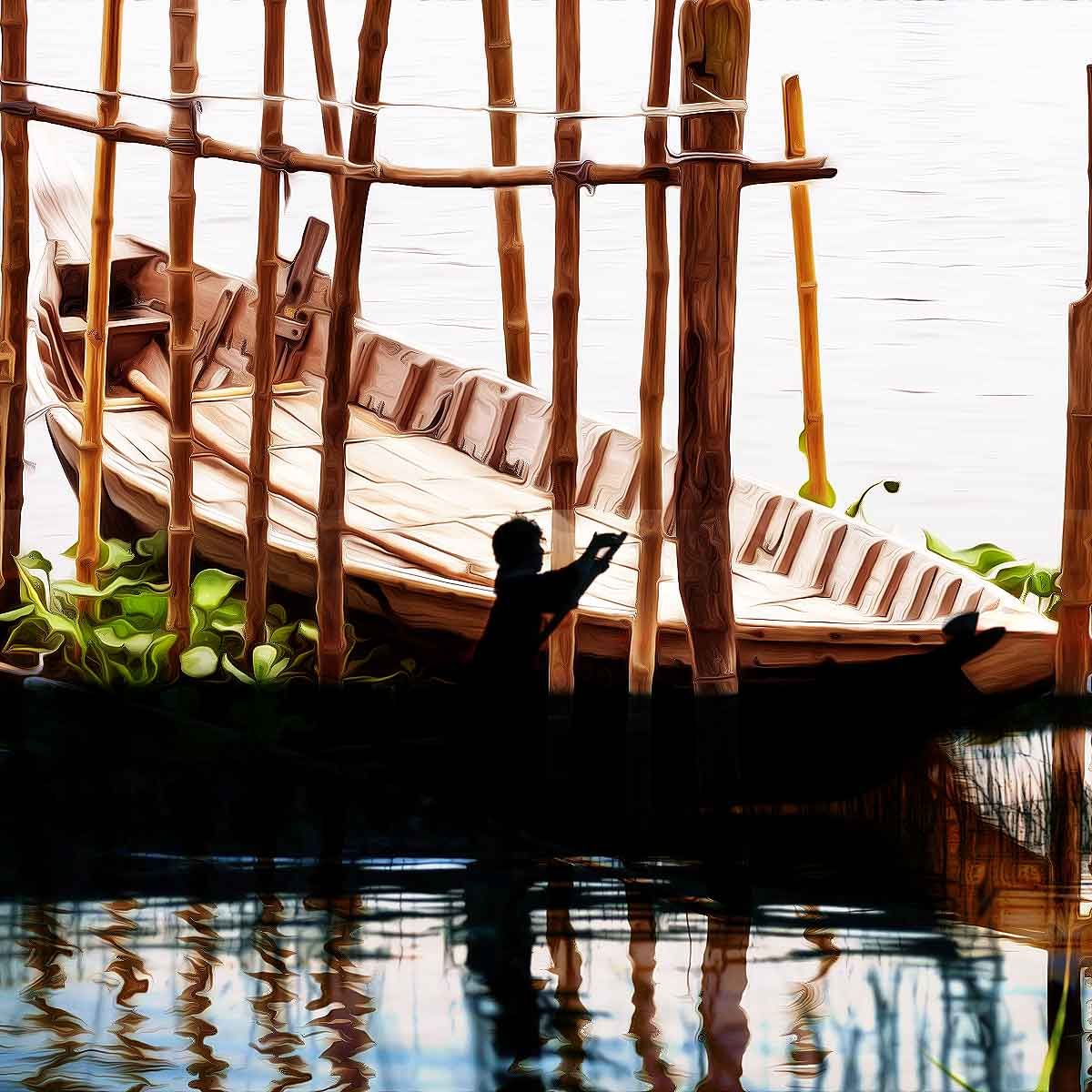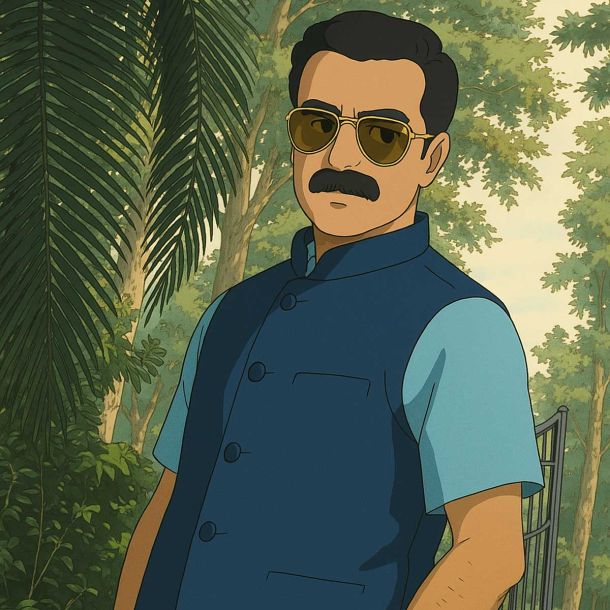More Coverage
Twitter Coverage
Satyaagrah
Written on
Satyaagrah
Written on
Satyaagrah
Written on
Satyaagrah
Written on
Satyaagrah
Written on
Join Satyaagrah Social Media
"The tyrant dies and his rule is over, the martyr dies and his rule begins": Baji Rout, a boat boy - youngest martyr of India's freedom struggle who was manhandled, threatened & skull fractured but refused to ferry British police across the Brahmani River

He was a boat boy from Odisha. A patriot to the core. He was a witness to oppression by the British and hated them. When British police asked him to ferry them to the other side of the Brahmani River, he flatly refused.
|
British police asked him again to obey their orders. He refused again. They manhandled him and threatened him with death.
Yet he remained adamant.
Better die for the motherland than give in to the commands and demands of the British!
And the British hit him hard on his head and fractured his skull.
He attained martyrdom on the Brahmani River bank. He was only 12 years old then.
We are delving about Baji Rout, one of India’s youngest freedom fighters. It is unfortunate that we haven’t read about him in our History textbooks. Except in Odisha, the name of Baji Rout hardly finds a place in books and media.
|
Baji Rout was born on 5th October 1926 at Nilakanthapur village in Dhenkanal, Odisha. His father was a boatman, who died when he was an infant. After his father’s death, the financial condition of his family turned worse. His weak and sick mother started earning meager amounts by grinding and husking paddy in well-to-do homes in her village.
Baji Rout received no formal education. From a young age, he started ferrying people in the Brahmani River, following his father’s occupation.
During the 1920s, the British entrusted local feudatory rulers, especially zamindars and landlords in many a princely state to collect taxes and perform other duties on their behalf in Odisha.
The civil rights of the people deteriorated with chances of their growth and development being crippled completely. They were deprived of the freedom of association and expression. They could neither meet in groups nor voice their opinion freely. The poor became poorer and the feudatory rulers and people under them grew richer.
The lands of many civilians were grabbed by these feudatory rulers. Anyone raising their voice was punished and British troops handled the situation using military force. Oppression by the British reached new heights.
Bihar, Jharkhand, and parts of Odisha were all parts of the Bengal Presidency of the British Raj. Bengal Presidency was then the biggest province of British India. The British created the province of Odisha in 1936 based on the language spoken by the inhabitants. They further reinforced the powers of the feudatory rulers, which in turn further worsened the condition of the people, especially the peasants. The system of forced labor and compulsory extraction of money became rampant. Few areas remained under the direct control of the British.
The natives, comprising of the oppressed, set up Praja Mandals (People’s Front) at various places in Odisha in 1938 to raise voices against the feudatory rulers and the British and fight against oppression and plunder. The Nilgiri chapter of Praja Mandal saw peasants demanding fairer laws. This was dealt with an iron hand with the natives subjected to even harsher and more brutal torture in response.
|
Baji Rout and many natives joined the Dhenkanal Praja Mandal group. This group submitted a petition demanding freedom of speech and association among other things. But their petition was rejected.
Stern measures were taken against the natives. Many were put behind bars. A series of repressive measures were forced upon the people. Public meetings were banned. But the Dhenkanal Praja Mandal group did not pay hid to the ban. They continued meeting and discussing in public places. British police opened fire at the defenseless natives, killing many. Besides, many were wounded.
Womenfolk were raped by the British police. They burnt down the houses of the villagers, who supported or were part of the Praja Mandal group. The teenage Baji Rout was witness to all of this. His blood boiled the more against the feudatory chiefs and the British.
Baji Rout earned a living by ferrying people in the Brahmani River. During the period of tension when the British police started atrocities against the natives, Baji Rout and other boatmen of the region became alert.
Praja Mandal members advised the boatmen and boat boys to keep guard at the banks of the river to keep check of the people who sided with the feudatory rulers and the British police and prevent them from crossing the river. Their crossing the river would only mean further plunder of the villages on the other side of the river by these enemies. For three nights from 7th October 1938, Baji Rout kept guard on the river bank, resting on his boat, despite incessant rains.
On the 10 th of October (1938), Baji Rout was asleep on his small ferry boat fastened to a tree. His boat had a thatched shed. In the darkness of the night, in the wee hours of 11th October, British police arrived at the place where Baji’s boat was parked. They had opened fire on a group of villagers in Bhuvan, two kilometers away from there. Just a night ago, they had killed two villagers. They woke up Baji Rout and ordered him to ferry them across the river to the other side.
British police pointed their guns at Baji and ordered him to ferry them fast. Baji Routt said, “This boat of mine belongs to the Praja Mandal. It cannot be hired out to you — the enemy of the people.”
The British police were taken aback listening to what the boy said. They never expected such a reply. A British policeman caught hold of him and shook his body violently while another hit him hard on his head with the heavy butt of his gun. And they continued ordering him to ferry them to the other side.
|
Baji Rout collapsed on the ground. The impact of the blow of the butt of the gun on his head was so fierce that his skull had a fracture and blood started oozing out profusely. But soon after Baji Rout got up, jumped to the river bank, and called out loud repeatedly, asking his friends to come. His voice echoed across his village and the sleeping villagers awoke to his call. Soon Praja Mandal members reached the spot.
By this time, the British police have unfastened the boat and were ready to ferry themselves on their own to the other side. A few of the Praja Mandal members who came with ropes fastened themselves to the boat by their waists and stood firm on the river bank like trees deeply rooted in the soil. British police cut the ropes and rowed away.
From a little distance, the British police fired shots at the Praja Mandal members standing on the river bank. Few attained martyrdom on the spot while few were fatally wounded. Baji Rout breathed his last at the river bank. Among the other martyrs were Hurushi Pradhan, Lakshman Mullick, Raghu Nayak, Guri Nayak, Nata Mullick, and Fagu Sahu.
Sachidananda Routray has well paid a tribute to Baji Rout with these opening lines of his poem:
It is not a pyre, O Friends! When the country is in dark despair, It is the light of our liberty.
It is our freedom fire." Salute to Baji Rout and all the martyrs! Jai Hind!
References:
Saffron Swords: Centuries of Indic Resistance to Invaders - Manoshi Sinha Rawal, Yogaditya Singh Rawal
 Support Us
Support Us
Satyagraha was born from the heart of our land, with an undying aim to unveil the true essence of Bharat. It seeks to illuminate the hidden tales of our valiant freedom fighters and the rich chronicles that haven't yet sung their complete melody in the mainstream.
While platforms like NDTV and 'The Wire' effortlessly garner funds under the banner of safeguarding democracy, we at Satyagraha walk a different path. Our strength and resonance come from you. In this journey to weave a stronger Bharat, every little contribution amplifies our voice. Let's come together, contribute as you can, and champion the true spirit of our nation.
 |  |  |
| ICICI Bank of Satyaagrah | Razorpay Bank of Satyaagrah | PayPal Bank of Satyaagrah - For International Payments |
If all above doesn't work, then try the LINK below:
Please share the article on other platforms
DISCLAIMER: The author is solely responsible for the views expressed in this article. The author carries the responsibility for citing and/or licensing of images utilized within the text. The website also frequently uses non-commercial images for representational purposes only in line with the article. We are not responsible for the authenticity of such images. If some images have a copyright issue, we request the person/entity to contact us at This email address is being protected from spambots. You need JavaScript enabled to view it. and we will take the necessary actions to resolve the issue.
Related Articles
- "You cannot expect to get the effect when you neglect to create the cause": 73 years after his death it was Modi who finally brought back ashes of Shyamji Krishna Varma and his wife from Geneva as their last wish to be returned to an independent India
- Film based on Nathuram Godse ‘Why I killed Gandhi’ gets opposition from Congress party demanding to ban the movie in Maharashtra, Cine Workers Association seek nationwide ban
- "Courage makes a man more than himself; for he is then himself plus his valor": Surya Sen - hero behind Chittagong armory raid & attack on Europeans only club that shook British like never before, brutally tortured and executed by British on Jan 12, 1934
- Meet The Dark Knight Of Kargil, Manoj Kumar Pandey, Who Made Rambo Seem Like A Joke
- Unsung Heroine Pritilata Waddedar, Who Shook The British Raj at the age of 21
- Tonkham Borpatra Gohain: Ahom general who badly defeated Afghan forces killing Islamic commander Turbak Khan in 1533 CE, battle took place at Duimunisila along banks of mighty Bharali River
- Taimur was attacked and defeated by 20 year old Rampyari Gurjar and her army of 40,000 women
- "Nak-Kati-Rani": Defying Shah Jahan, Rani Karnavati of Garhwal inflicted unprecedented humiliation on the Mughal army, cutting off their noses; her invincible spirit remain unsung in mainstream history, overshadowing the grand tales of emperors
- Rana Sanga, the symbol of bravery who defeated Sultan Ibrahim Lodhi and fought Muslim Terrorists for Hindu Existence
- Rani Chennamma of Keladi who fought bravely against Mughals and gave shelter to Shivaji’s son Rajaram, killed more than half of the forces of Aurangzeb's son Azamath Ara
- "The Forgotten Father of Armed Revolution in India": Vasudev Balwant Phadke led the first militia in 1879, rallied 300 armed Ramoshis, looted British treasuries, escaped Aden jail, and died on hunger strike—igniting freedom long before Bhagat Singh
- A Great man Beyond Criticism - Martyrdom of Shaheed Bhagat Singh (Some Hidden Facts)
- "The tyrant dies and his rule is over, the martyr dies and his rule begins": Paona Brajabashi - Fearless Manipur General who valiantly led his 300 soldiers in one of the fiercest battles in history in the Battle of Khongjom against the British in 1891
- Hero of Pawankhind: Veer Maratha Bajiprabhu Deshpande, who led 300 Soldiers against 12000 Adilshahi Army defending Shivaji
- Remarkable return to Uttar Pradesh of Dr. Gita Patel, a Sardar Vallabhbhai Patel's descendant, embraces the state's good governance under Aditya Yoginath, she ushers in a groundbreaking revolution in cancer treatment, shaping a brighter future for UP
























